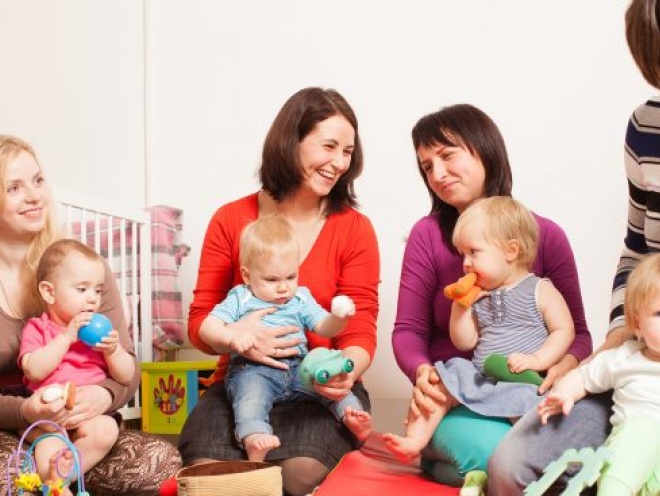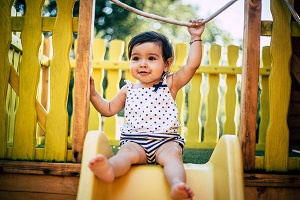Worried about baby growth charts and milestones? Professor Angelica Ronald explains how temperaments and development differ and how to support your baby.
Hearing about ‘typical’ milestones in baby development can make you think that all babies should be the same (NCT, 2018). It can also make parents feel anxious about when their baby does or should be doing something.
But just as we wouldn’t expect all adults to like the same foods, bedtimes, or behave the same way, we shouldn’t expect babies to either. Here’s how and why…
How do babies differ from each other?
For a start, babies naturally have different temperaments. This can affect how easy it is to soothe them and how often they smile. It can also affect how active they are, how fearful they seem and how long they spend looking at things (Gartstein and Rothbart, 2003).
A second way that babies differ is in their sleeping patterns. Not only do babies change their sleeping patterns in the early months, they also often vary with one another (Kandel et al, 2013). That might make you feel a little better when your friend tells you her little angel sleeps through the night when yours definitely doesn’t.
What causes babies to differ from one another?
To some extent it’s down to biology (Papageorgiou and Ronald, 2013). A baby’s temperament is partly down to their genes, not just their environment (Goldsmith et al, 1999).
Genes affect levels of chemicals, such as neurotransmitters, and these chemicals influence how the brain works. They might influence how reactive a baby is and how long they stay focused on things (Papageorgiou and Ronald, 2013). These are all things that shape a baby’s temperament and personality.
At the same time, the differences we see between babies are also due to their environment. We don’t all live in the same house, in the same location. We don’t eat the same diet and babies don’t share the same womb and placenta. We know that a baby’s environment (both in the womb and after) influences their development (Plomin et al, 2013; Knopiket al, 2016).
When do the differences between babies start?
Amazingly, we think that some differences between babies are there from the beginning. Some research has studied babies when they are newborns. For example, we know that even in the first few days of life babies differ in how long they look at objects (Papageorgiou et al, 2015).
Like the saying ‘you can’t run before you can walk’, as babies grow and develop, one thing follows another. So it’s not just a single stage that is special to each baby. Their whole journey of growing and maturing is unique to them.
What can I do to help my baby?
We all want to be accepted for who we are. Babies are no exception. So try keeping track of what your baby is like rather than comparing them with others. Your baby is an individual who’s just trying to do their thing.
We know that babies are not blank slates that we can mould to our vision of the ‘perfect child’ (Plomin et al, 2013). At the same time, we can help our babies by choosing environments that suit them, by talking to them and playing with them.
And don’t forget that looking after yourself will help your child’s development, as well as your own health (McAdams et al, 2015; Van den Bergh et al, 2017). If you ever feel worried about your baby’s development, talk to your GP.
Professor Angelica Ronald, Ph.D., is the Director at Genes Environment Lifespan (GEL) laboratory, Centre for Brain and Cognitive Development (CBCD) at the Department of Psychological Sciences at Birkbeck, University of London.
This page was last reviewed in August 2018
Further information
Our support line offers practical and emotional support with feeding your baby and general enquiries for parents, members and volunteers: 0300 330 0700.
You might find attending one of our NCT New Baby groups helpful as they give you the opportunity to explore different approaches to important parenting issues with a qualified group leader and other new parents in your area.
Make friends with other parents-to-be and new parents in your local area for support and friendship by seeing what NCT activities are happening nearby.
Entringer S, Hoyer D, Roseboom T, Räikkönen K, King S, Schwab M.(2017). Prenatal developmental origins of behavior and mental health: The influence of maternal stress in pregnancy. Neuroscience and Biobehavioural Reviews. S0149-7634(16):30734-30735. Available from: https://www.ncbi.nlm.nih.gov/pubmed/28757456 [Accessed 31st August 2018]
Gartstein MA, Rothbart MK. (2003) Studying infant temperament via the Revised Infant Behavior Questionnaire. Infant Behaviour and Development (26):64-86. Available from: https://www.sciencedirect.com/science/article/pii/S0163638302001698 [Accessed: 31st August 2018]
Goldsmith HH, Lemery KS, Buss KA, Campos JJ. (1999) Genetic analyses of focal aspects of infant temperament. Dev Psychol. 35(4):972-985. Available from: https://www.ncbi.nlm.nih.gov/pubmed/10442866 [Accessed: 31st August 2018]
Kandel E, Schwartz J, Jessell T, Siegelbaum S, Hudspeth AJ. (2013) Principles of Neural Science, Fifth Edition. McGraw-Hill Education [Accessed 31st August 2018]
Knopik VS, Neiderhiser JM, De Geus E, Boomsma, D. (2016) The Importance of the Prenatal Environment in Behavioral Genetics: Introduction to Special Issue. Behav Genet. 46(3):281-285. Available from: https://www.ncbi.nlm.nih.gov/pubmed/27085879 [Accessed 31st August 2018]
McAdams TA, Rijsdijk FV, Neiderhiser JM, Narusyte J, Shaw DS, Natsuaki MN, Spotts EL, Ganiban JM, Reiss D, Leve LD, Lichtenstein P, Eley TC.(2014) The relationship between parental depressive symptoms and offspring psychopathology: evidence from a children-of-twins study and an adoption study. Psychological Medicine. (45):2583-2594. Available from: https://www.ncbi.nlm.nih.gov/pubmed/25994116 [Accessed 31st August 2018]
NCT. (2018) Developmental milestones. Available from: http://www.nct.org.uk/courses/postnatal/developmental-milestones [Accessed 31st August 2018]
Papageorgiou KA, Farroni T, Johnson MH, Smith TJ, Ronald A. (2015). Individual differences in newborn visual attention associate with temperament and behavioral difficulties in later childhood. Sci Rep.(5):11264. [Accessed 31st August 2018]
Papageorgiou KA, Ronald A. (2013). "He who sees things grow from the beginning will have the finest view of them" a systematic review of genetic studies on psychological traits in infancy. Neurosci Biobehav Rev. 37(8):1500-1517. Available from: https://www.ncbi.nlm.nih.gov/pubmed/23644044 [Accessed 31st August 2018]
Plomin R, DeFries JC, Knopik VS, Neiderhiser JM. (2013) Behavioral Genetics, 6th edition. New York: Worth Publishers. [Accessed 31st August 2018]
Van den Bergh BRH, van den Heuvel MI, Lahti M, Braeken M, de Rooij SR,







